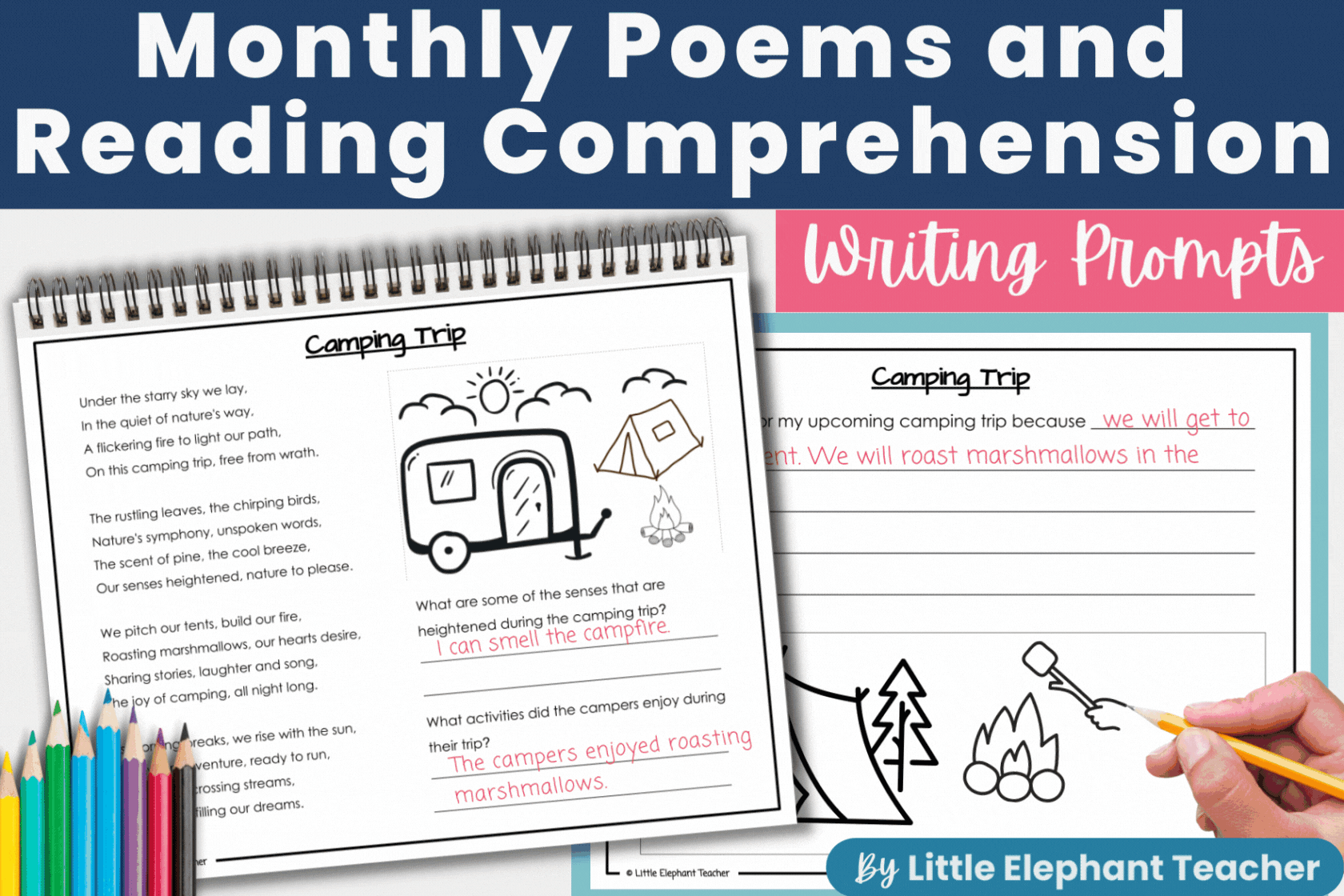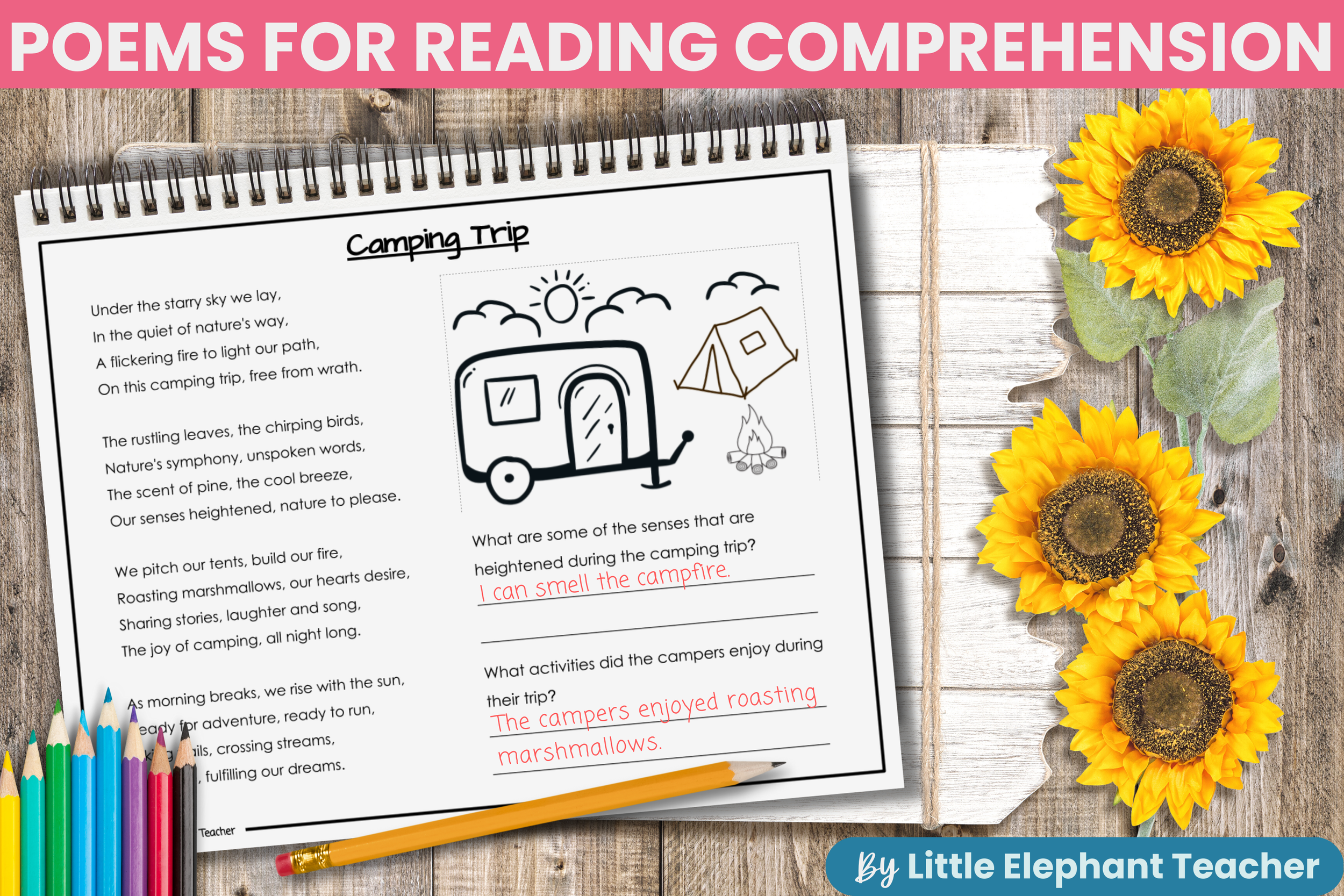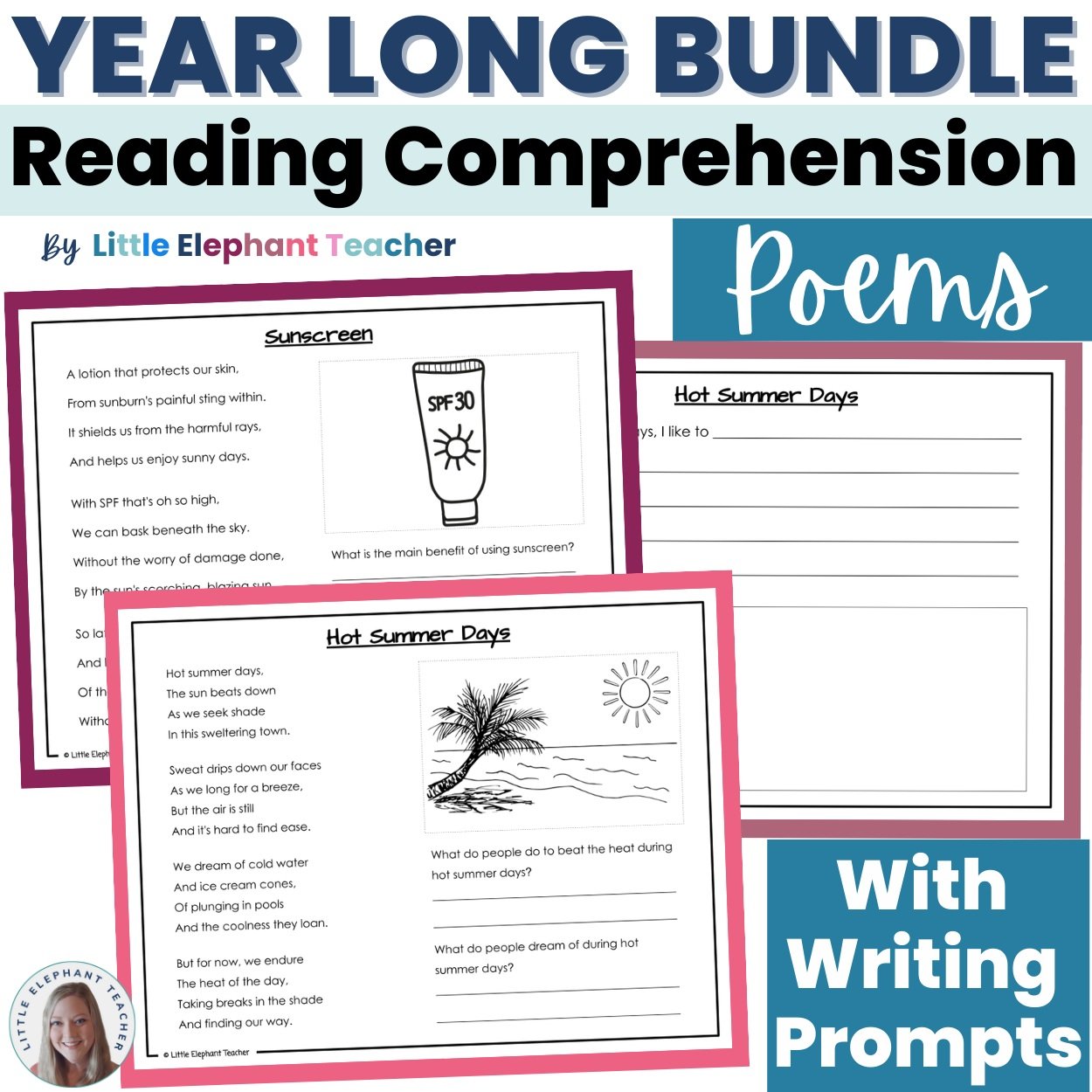Strategically Crafted Reading Comprehension Questions for Enriching Monthly Poems
Are your students struggling to answer reading comprehension questions? As an educator, you know that teaching reading comprehension can be a challenge, especially for struggling readers. However, I am going to share some creative and effective strategies that can help your students improve their reading skills while adding a touch of seasonal charm to your classroom. By incorporating the use of Monthly Poems and strategically crafted comprehension questions for reading, you can create a fun and engaging reading time that your students will love. In this blog post, we'll explore exciting ways to teach reading comprehension questions with Monthly Poems and the value of incorporating them into your reading lessons! Grab a Free Lesson Plan you can use with these Reading Comprehension Questions for Monthly Poems. Don’t forget to grab your free Lesson Plans for Poems below!
What are Reading Comprehension Questions
Reading comprehension questions are a set of queries designed to assess a reader's understanding of a text. These questions aim to evaluate the reader's ability to grasp the meaning, ideas, and details presented in the text, as well as their capacity to make inferences, analyze, and synthesize information. Teachers and educators can use reading comprehension questions to measure a student’s progress and guide instruction or by individuals to practice and improve their reading skills.
There are different types of reading comprehension questions, including:
Literal questions: These questions focus on the basic facts and details found directly in the text. They require the reader to recall specific information, such as names, dates, or events.
Inferential questions: These questions ask the reader to make inferences or draw conclusions based on the information provided in the text. They require the reader to "read between the lines" and use context clues to understand the author's intended meaning.
Analytical questions: These questions challenge the reader to analyze the text, examining elements such as the author's purpose, tone, and writing style. Analytical questions may also involve comparing and contrasting different parts of the text or identifying cause-and-effect relationships.
Evaluative questions: These questions encourage the reader to form an opinion about the text, assessing its quality, credibility, or relevance. Evaluative questions often require the reader to reflect on their own beliefs, values, and experiences in relation to the text.
Synthesis questions: These questions ask the reader to connect the text to other information they have encountered, either from other texts or their personal experiences. Synthesis questions promote critical thinking by requiring the reader to make connections, identify patterns, and integrate new information with prior knowledge.
Exciting Ways to Teach Reading Comprehension Questions
Here are three exciting ways to teach reading comprehension questions using poems. These methods aim to engage students, spark their creativity, and encourage critical thinking about the text.
1. Poetry Performance
Encouraging students to perform a poem can help them connect with the text on a deeper level, as they'll need to understand the tone, emotions, and themes conveyed by the poet.
Implementation: Divide students into small groups and assign each group a poem. Ask them to read the poem and answer reading comprehension questions related to the text. Next, instruct the groups to create a performance of the poem, which could include dramatic readings, interpretive dance, or visual representations of the poem's imagery. Encourage students to incorporate their answers to the comprehension questions in their performance. Finally, have each group present their performance to the class, followed by a discussion about the poem's meaning and the creative choices made during the performances.
Resources Needed: Copies of selected poems, space for rehearsals and performances, and any necessary props or materials for the performances.
2. Illustrated Poem Analysis
By creating visual representations of a poem, students can develop a deeper understanding of its meaning, themes, and imagery. This method also caters to visual learners and encourages creative thinking.
Implementation: Provide each student with a copy of a poem and a set of reading comprehension questions related to the text. After reading the poem and answering the questions, ask students to create an illustration, collage, or visual representation of the poem that incorporates their understanding of the text. Encourage students to use symbols, colors, and images to represent the poem's themes, emotions, and imagery. Once completed, have students share their artwork with the class and explain how their visual representation connects to the poem and the comprehension questions.
Resources Needed: Copies of the selected poem, art supplies (paper, colored pencils, markers, scissors, glue, etc.), and space for students to work on their illustrations.
3. Poetry Debate
A poetry debate encourages students to think critically about a poem's meaning, themes, and language by engaging in a structured discussion with their peers.
Implementation: Select a poem and develop reading comprehension questions that focus on the text's meaning, themes, and language. Divide the class into two or more groups, with each group tasked with defending a specific interpretation of the poem based on their answers to the comprehension questions. Give students time to prepare their arguments and find evidence from the text to support their claims. Then, hold a structured debate where each group presents their interpretation, followed by a question-and-answer session with the opposing group(s). After the debate, have a class discussion about the different interpretations and the importance of considering multiple perspectives when analyzing a poem.
Resources Needed: Copies of the selected poem, a list of reading comprehension questions, and a designated space for the debate.
How Monthly Poems Can Help Improve Reading Comprehension
Monthly Poems are a fantastic way to engage students with the material they're reading. They provide a relevant and relatable context that captures students' attention and makes learning more enjoyable. With themes like fall harvest, winter wonderland, spring blossoms, and summer fun, Monthly Poems offer a fresh approach to reading comprehension lessons.
Here are some ways Monthly Poems can help improve reading comprehension:
Vocabulary Building: Monthly Poems often introduce new words related to the theme, which helps expand students' vocabulary and improve their understanding of the text.
Cultural Awareness: Poems about holidays, traditions, and seasonal events expose students to various cultural perspectives, fostering empathy and respect for diversity.
Creativity and Imagination: Monthly Poems encourage students to use their imagination and visualize the scenes described in the text, which is an essential skill for reading comprehension.
Critical Thinking: By analyzing the structure, themes, and language of Monthly Poems, students develop critical thinking skills that are crucial for understanding complex texts.
Implementing Monthly Poems into Your Reading Lessons
To make the most of Monthly Poems in your reading lessons, follow these steps:
Choose a Monthly Theme: Select a theme that corresponds to the current season or an upcoming holiday. This will add excitement and relevance to the reading material.
Find Monthly Poems: Look for poems that match your chosen theme. You can find these in books, online resources, or even write your own!
Craft Reading Comprehension Questions: Create questions that encourage students to analyze the poem's structure, language, and themes. Make sure to include questions that target different levels of comprehension, from simple recall to deeper analysis.
Incorporate Monthly Fluency Poems and Reading Comprehension with Question: Enhance your lessons with Monthly Fluency Poems and Reading Comprehension with Question, which offers additional tools and resources to support reading comprehension.
Evaluate Progress: Regularly assess students' understanding of the poems and their ability to answer comprehension questions. Adjust your teaching strategies as needed to ensure continued growth and improvement.
This creative and engaging lesson plan, incorporating the Monthly Poems with Reading Comprehension Questions, will help students approach reading and comprehension of poetry in a fun and interactive way. By combining discussions and reflection activities. Your students will develop a deeper appreciation for poetry and improve their critical thinking and reading comprehension skills.
Find your Monthly Poems with Reading Comprehension Questions
Lesson Plan: Monthly Poems with Reading Comprehension Questions
Learning Goals:
Improve reading comprehension skills through the analysis of poetry.
Expand vocabulary by identifying and understanding new words in the context of a poem.
Develop critical thinking and interpretation skills by discussing and reflecting on the themes, imagery, and language used in poetry.
Encourage creativity and self-expression through pre-reading and post-reading activities.
Materials Needed:
Monthly Poems with Reading Comprehension Questions from my TPT store
Whiteboard or blackboard
Writing utensils (pencils, pens, markers)
Paper or notebooks for each student
Computer and projector for audiovisual aids (optional)
By incorporating Monthly Poems and strategically crafted reading comprehension questions into your reading block, you can create a fun and engaging learning environment that helps struggling readers improve their skills. With exciting monthly themes and the support of Monthly Poems with Reading Comprehension Questions, your students will look forward to reading lessons and develop a lifelong love for literature. Don't wait any longer! Start using these Monthly Poems with your struggling readers today.


















